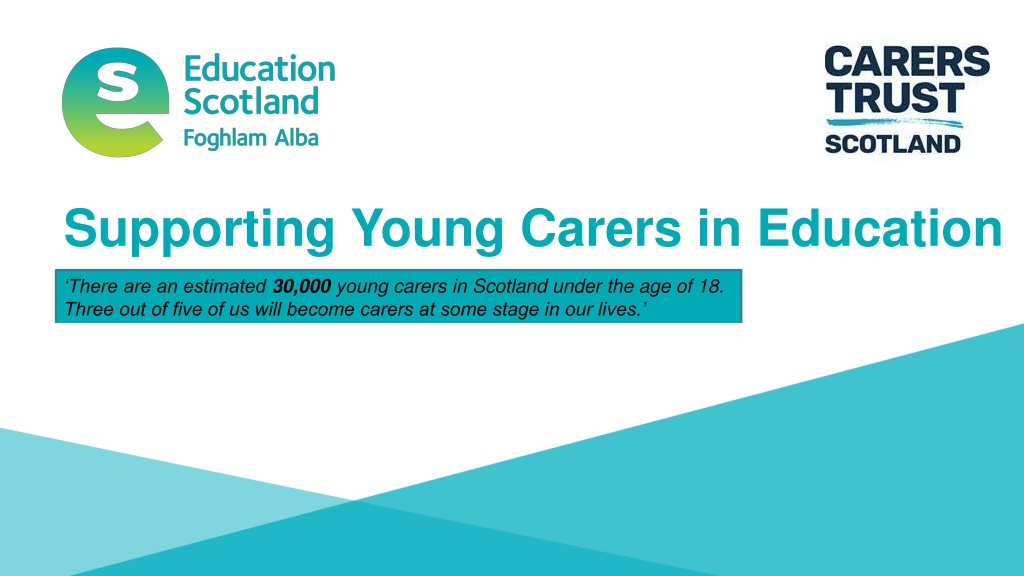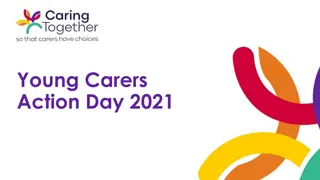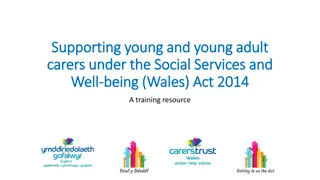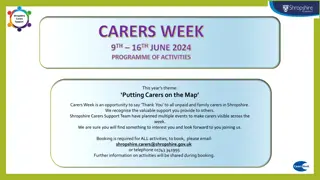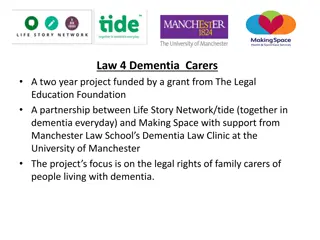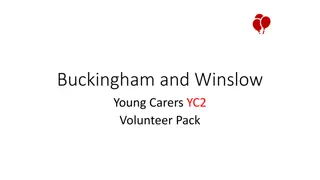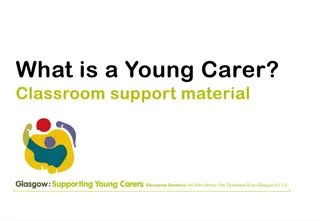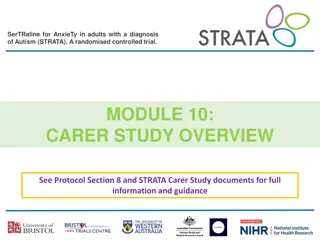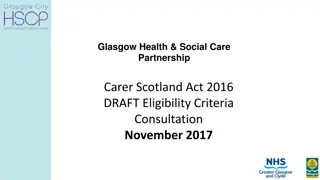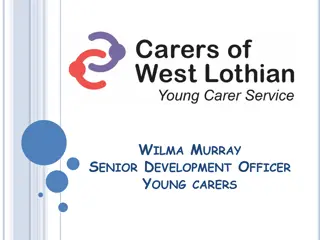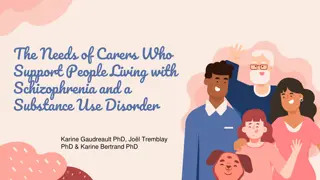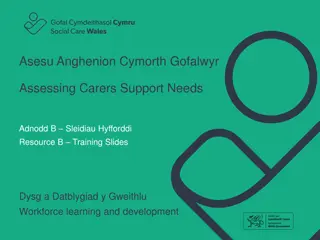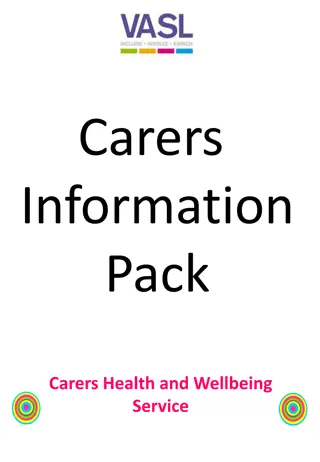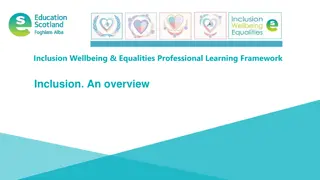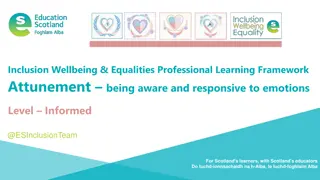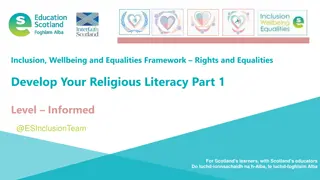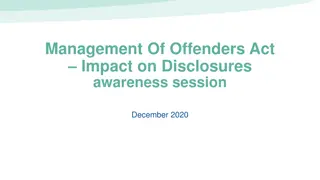Supporting Young Carers in Education - A Guide for Educators in Scotland
There are an estimated 30,000 young carers in Scotland under the age of 18. This guide aims to help educators in identifying and supporting young carers in education. Young carers have diverse responsibilities, including domestic activities, household and financial management, personal and emotional care, sibling care, and acting as communication brokers. Understanding the basics and challenges faced by young carers is crucial for providing them with appropriate support.
Download Presentation

Please find below an Image/Link to download the presentation.
The content on the website is provided AS IS for your information and personal use only. It may not be sold, licensed, or shared on other websites without obtaining consent from the author. Download presentation by click this link. If you encounter any issues during the download, it is possible that the publisher has removed the file from their server.
E N D
Presentation Transcript
Supporting Young Carers in Education There are an estimated 30,000 young carers in Scotland under the age of 18. Three out of five of us will become carers at some stage in our lives. Carers Trust For Scotland's learners, with Scotland's educators Supporting Young Carers in Education For Scotland s learners, with Scotland s educators
Module 1: Identifying Young Carers in Education Module 1A: The Basics about Young Carers! This module is suitable for everyone who works with children and young people For Scotland's learners, with Scotland's educators Supporting Young Carers in Education For Scotland s learners, with Scotland s educators
About Young Carers the absolute basics! A young carer is someone under 18 who helps look after someone in their family, or a friend, who is ill, disabled, has a mental health condition or misuses drugs or alcohol They can have emotional as well as practical caring responsibilities The level of responsibility that is sometimes placed on young carers would normally be associated with that of an adult Some young carers look after more than one person and may also have health issues of their own Young carers may start providing care at a very young age, other young people become carers overnight Some young carers don t realise they are, or recognise themselves, as carers Often the condition of the person they care for is not obvious so other people don t realise that the young person needs help For Scotland's learners, with Scotland's educators Supporting Young Carers in Education
What is a young carer? 3 min 18 sec https://www.youtube.com/watch?v=BxzoS3-ILu4 For Scotland's learners, with Scotland's educators Supporting Young Carers in Education
What do young carers do? Young carers can have many responsibilities that may include but are not restricted to: Domestic activities - cleaning, laundry, washing, . Household management - food shopping, cooking, . Financial management - withdrawing cash, paying bills, managing the family budget, . Practical management organising appointments , collecting prescriptions, . Personal care - washing, bathing, giving medication, helping someone get up or move around, . Emotional care - making sure the person they care for is okay Sibling care - looking after a brother or sister Act as communication brokers for the cared for person, for example, those with language barriers For Scotland's learners, with Scotland's educators Supporting Young Carers in Education
Young Carer Statistics Scottish Government recognise that there are at least 30,000 young carers in Scotland Extensive survey work by young carers services and Carers Trust show that 1 in 5 children in a class has a caring role However in the whole of Scotland only 5107 young carers are recorded on SEEMiS 2022 Pupil Census in Scotland (Publicly funded primary and secondary schools) For Scotland's learners, with Scotland's educators Supporting Young Carers in Education
Activity Reflection Question 1 If there are so many young carers in Scotland why do you think we only know about a small number of them? For Scotland's learners, with Scotland's educators Supporting Young Carers in Education
Hidden young carers Often the young carer:- wants to keep caring a secret due to worry that they may be taken into care and/or the family split up does not realise that they are a carer or that their life is different to their peers has not had an opportunity to share their story does not feel they have someone they can trust to talk to about their caring role does not want to be considered different to their peers is embarrassed about their caring role or they don t want others to think badly about their parents or family is worried about bullying wants to keep their identity at school/college/work separate from their caring role For Scotland's learners, with Scotland's educators Supporting Young Carers in Education
Young Carer Media Ambassadors A group of young carers created a short film about the issues young carers are experiencing. They participated in training with Media Education and created a storyboard for their film. Filming this remotely, the group conducted peer led interviews with young carers across Scotland. Their film focuses on themes important to young carers including education, respite and loneliness. https://www.youtube.com/ watch?v=KMqjBcIitJM (4 min 16 sec) For Scotland's learners, with Scotland's educators Supporting Young Carers in Education
Activity Reflection question 2 In an educational or child care setting what could be signs that a child or young person might have caring responsibilities? For Scotland's learners, with Scotland's educators Supporting Young Carers in Education
Possible signs that might suggest someone has caring responsibilities: Is often late or misses days or weeks off school Doesn t hand in homework/coursework on time, or quality of their work drops Often tired, anxious, withdrawn or irritable Gets on well with adults and presents as mature for their age Is bullied or fights with peers (sometimes linked to a family member s disability or health) Finds it difficult to concentrate on their work Has difficulty joining extracurricular activities or is unable to attend school trips Checks their phone or regularly contacts the person they care for Has physical problems such as back pain (perhaps from heavy lifting) Is secretive about home life For Scotland's learners, with Scotland's educators Supporting Young Carers in Education
Positive and negative impact of caring: Young carers tell us there are many positives of being a carer: They also tell us there are can be negative You have a sense of responsibility impacts of taking on a caring role: You feel closer to your family You have less time for play, leisure or sport You feel proud about being able to care for the people you It can be stressful and cause anxiety love It can make it difficult to make or maintain You learn a lot of life skills earlier such as how to be resilient, friendships organisation and practical household skills, time You can feel isolated management, budgeting You can feel like no one else understands You have more awareness of medical or emotional issues, You can feel guilty when you want or take a etc. break from caring Young carers are more likely to report a mental health condition or ill health than their peers, and this likelihood increases as the hours spent caring increases For Scotland's learners, with Scotland's educators Supporting Young Carers in Education
Mental Health of Young Carers https://www.youtube.com/watch?v=pFKIB25XIIQ (2 min 31 sec) For Scotland's learners, with Scotland's educators Supporting Young Carers in Education
Impact of Caring on a Young Carer in education In their education young carers may: be distracted (for example, checking their phone often) be quiet or withdrawn find it difficult to engage in learning because of worry or tiredness have difficulties doing homework due to a lack of time or opportunity to study at home lack support from home for school activities such as parents nights/open days feel pressured to remain in a caring role after they leave school not progress onto a positive destination such as further/higher education, training, or work due to their caring responsibilities For Scotland's learners, with Scotland's educators Supporting Young Carers in Education
Identifying Young carers: See me, Include me, Support me This film by the NHS Education Service primarily for health and social care workers is really good for anyone who works with and supports young carers (5 min 30 sec) https://vimeo.com/showcase/9644783 5 min 30 sec) For Scotland's learners, with Scotland's educators Supporting Young Carers in Education
Activity Reflection In your educational or childcare setting is there a process for identifying young carers For Scotland's learners, with Scotland's educators Supporting Young Carers in Education
And finally.. Based on today s professional learning: What will you, as an individual, do differently? What will your school do differently? How will you help your learning community do things differently? For Scotland's learners, with Scotland's educators Supporting Young Carers in Education
